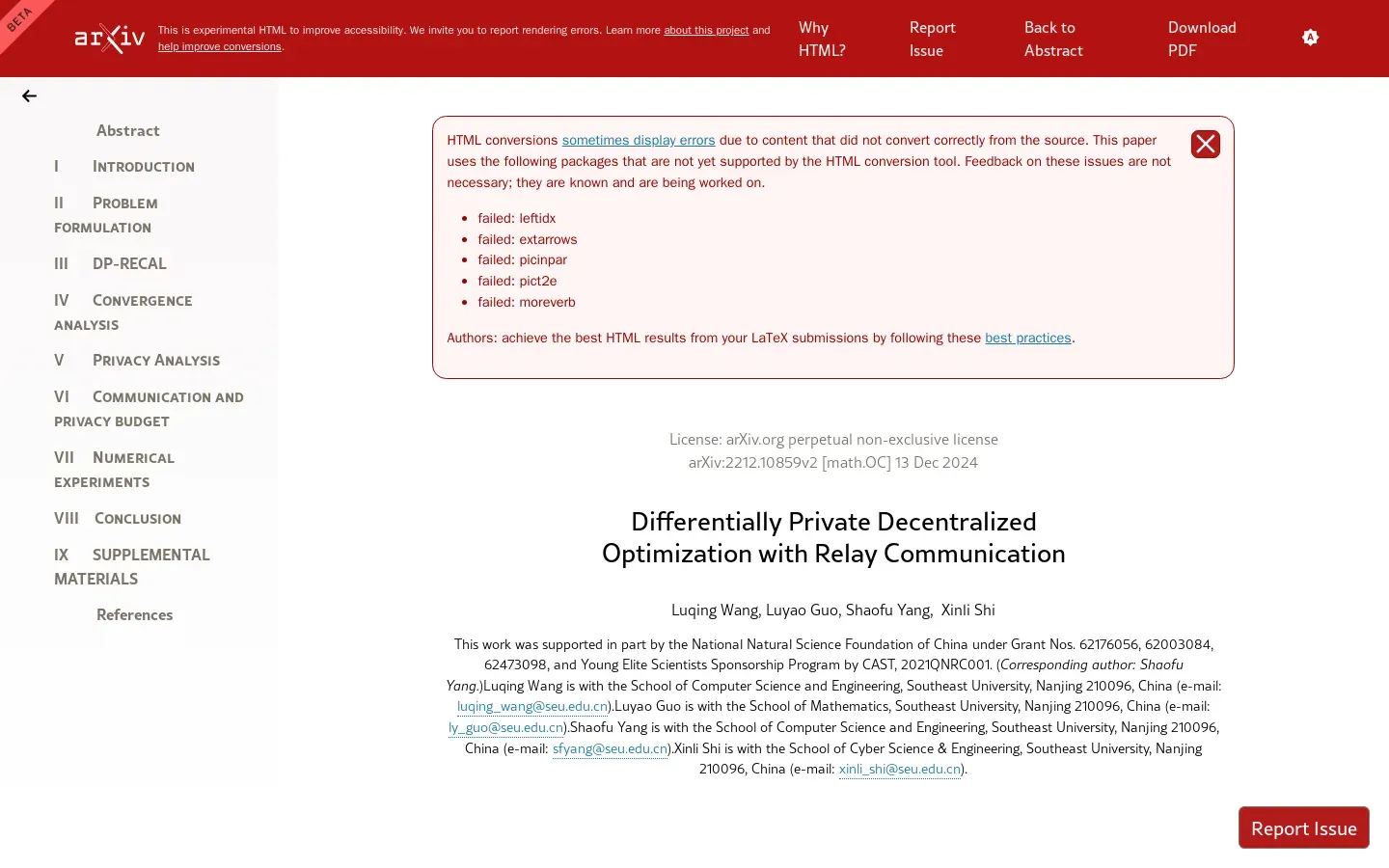
Advancements in Differentially Private Decentralized Optimization Techniques
/ 4 min read
Quick take - Recent research by Luqing Wang et al. has introduced the DP-RECAL algorithm, a privacy-preserving decentralized optimization technique that enhances security in large-scale networked environments while addressing privacy leakage concerns and demonstrating improved efficiency and robustness against adversarial attacks.
Fast Facts
- Introduction of PLF: The study defines Privacy Leakage Frequency (PLF) to measure unintentional private information disclosure in decentralized systems.
- DP-RECAL Algorithm: A new decentralized optimization algorithm that enhances privacy and efficiency using differential privacy principles.
- Convergence and Performance: The research analyzes the convergence properties of DP-RECAL, demonstrating its effectiveness compared to existing differentially private algorithms in logistic regression.
- Empirical Validation: Numerical experiments confirm DP-RECAL’s ability to maintain privacy while optimizing communication efficiency, with lower communication overhead and robustness against attacks.
- Future Applications: Potential uses include decentralized threat detection, collaborative machine learning for cybersecurity, and integration with blockchain technology for enhanced security.
Advancements in Privacy-Preserving Decentralized Optimization: A New Frontier in Cybersecurity
In a significant stride towards enhancing cybersecurity, recent research led by Luqing Wang and colleagues has introduced groundbreaking advancements in privacy-preserving techniques for decentralized optimization. The study, which focuses on the development of the DP-RECAL algorithm, addresses pressing security concerns within large-scale networked environments by integrating robust privacy measures. This development marks a pivotal contribution to the ever-evolving field of cybersecurity.
Key Developments in Privacy Preservation
Privacy Leakage Frequency (PLF)
A notable concept introduced in this study is the Privacy Leakage Frequency (PLF). PLF serves as a metric to quantify how often private information might be inadvertently disclosed during data processing in decentralized systems. This metric is crucial for understanding and mitigating privacy risks associated with decentralized optimization.
The DP-RECAL Algorithm
At the heart of this research is the DP-RECAL algorithm, a novel approach designed to operate under the principles of differential privacy. The algorithm aims to enhance both privacy and efficiency, particularly in environments where data sensitivity is critical. By leveraging differential privacy, DP-RECAL ensures that individual data points remain protected even as they contribute to larger datasets.
Convergence Analysis
The study delves into the convergence properties of the DP-RECAL algorithm, especially within decentralized logistic regression contexts. Through rigorous analysis, the researchers compare its performance against existing differentially private algorithms, highlighting its superior ability to maintain privacy without sacrificing efficiency.
Empirical Evaluation
To validate the effectiveness of DP-RECAL, the research employs numerical experiments and adversarial simulations. These tests demonstrate the algorithm’s capability to preserve privacy while optimizing communication efficiency, making it a promising tool for resource-constrained environments.
Supporting Details: Balancing Privacy and Performance
The findings from Wang et al.’s research underscore the effectiveness of DP-RECAL in achieving a delicate balance between privacy, efficiency, and performance in decentralized optimization tasks. One of its standout features is its ability to significantly reduce communication overhead compared to other decentralized algorithms. This reduction makes it an attractive option for environments where resources are limited.
Moreover, DP-RECAL exhibits robustness against adversarial attacks, particularly gradient leakage attacks. This robustness ensures that privacy is preserved without compromising classification accuracy—a critical factor in maintaining trust in decentralized systems.
Despite these strengths, the study acknowledges certain limitations and areas for further exploration. These include optimizing convergence rates and investigating additional privacy-preserving mechanisms to bolster security further.
Tools and Frameworks Underpinning DP-RECAL
Several crucial tools and frameworks underpin the development of DP-RECAL:
-
Differential Privacy (DP): Serving as a foundational principle, differential privacy guides the design of DP-RECAL by safeguarding individual data points within larger datasets.
-
Operator Splitting Method: This technique contributes to the computational efficiency of the algorithm, enabling it to handle complex optimization tasks effectively.
-
Zero Concentrated Differential Privacy (zCDP): An advanced form of differential privacy that enhances the security guarantees provided by DP-RECAL.
Future Directions: Expanding Applications
The implications of the DP-RECAL algorithm extend beyond theoretical advancements. Potential future applications include:
-
Decentralized Threat Detection Systems: Enhancing security measures in collaborative environments by leveraging decentralized approaches.
-
Collaborative Machine Learning for Cybersecurity: Improving machine learning outcomes while maintaining stringent privacy standards.
-
Integration with Blockchain Technology: Exploring synergies between decentralized optimization and blockchain for heightened security.
As digital landscapes continue to evolve, integrating privacy considerations into decentralized optimization algorithms becomes increasingly vital. The insights gained from this study will inform future developments in cybersecurity, paving the way for more effective and secure systems capable of addressing challenges posed by data sensitivity and privacy leakage.



